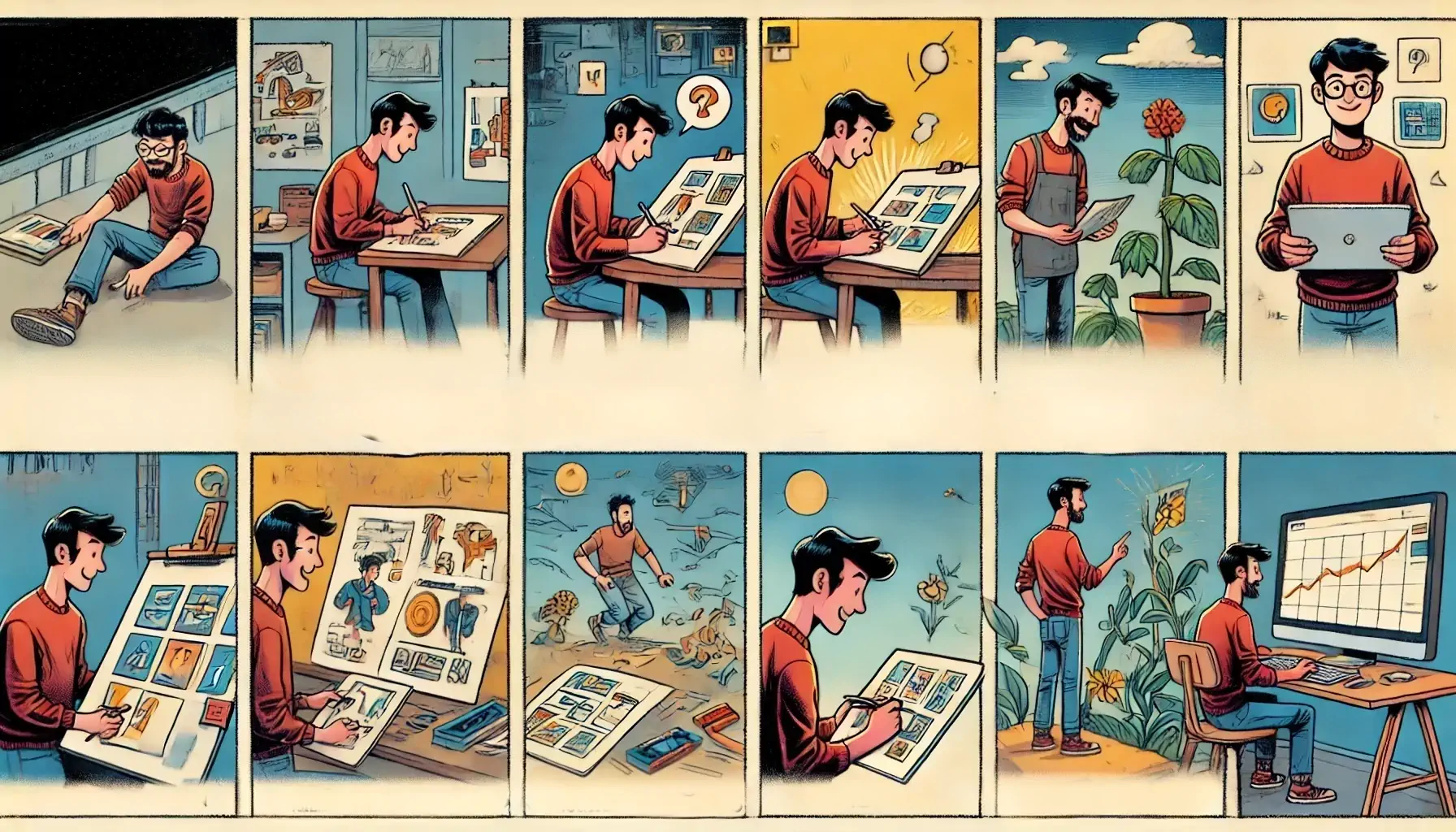Editor’s Note: This is the culmination of 15+ years of growing teams and individuals. It is an ever-expanding anchor article. It will be updated and expanded over time including additional context, illustrations, images, and anything else required to ensure you are well-informed for your journey.
Designing Your Career Path
Navigating your career as a designer is akin to progressing through a well-defined game, where each level—Developing, Proficient, Accomplished, and Mastered—challenges you to hone specific skills and broaden your impact. Imagine each phase as a new chapter in your professional story, where expectations grow, and your ability to drive results and collaborate effectively becomes more crucial.
At the heart of this journey is a steadfast commitment to a one-team ethos and a relentless focus on customer satisfaction. These aren’t just buzzwords; they’re the bedrock of every interaction and decision. Success here isn’t a solo mission; it’s a concerted effort, supported by the whole organization, fostering a culture where growth is both celebrated and expected.
About the Framework
This framework isn’t about racing to the finish line; it’s about savoring each step, making meaningful contributions, and expanding your horizons. As you evolve from Developing to Mastered, your growing expertise not only fulfills personal ambitions but also aligns closely with the broader objectives of the company. It’s about finding that sweet spot where your passions meet business needs—a powerful motivator that makes every morning’s challenge worth facing.
Growth Framework
Transformative Phases
The growth journey is divided into four transformative phases—Developing, Proficient, Accomplished, and Mastered. These stages are designed to foster a robust development of skills, impact, and team contributions, steering clear of merely ticking boxes.
- Developing: You’re getting acquainted with the expectations of your current level.
- Proficient: You meet and consistently exceed the foundational expectations of your role.
- Accomplished: You excel beyond the normal demands of your position, pushing the boundaries of what’s expected.
- Mastered: You redefine standards of excellence and are ready to take on greater challenges.
Progress is demonstrated through skill progression from the current level to mastery. Reaching a “Mastered” status indicates readiness for the next career phase.
This holistic strategy emphasizes thorough development of skills, impactful contributions, and team and customer engagement, rather than merely checking off requirements.
Skill Evolution Across Levels
Attaining “Mastered” status at one level can position someone as “Proficient” or “Accomplished” at the next higher level. Likewise, being “Accomplished” might equate to “Developing” status after a promotion to a more advanced stage.
Foundational Skills
Many organizations adopt a framework that emphasizes four foundational skills essential for success: customer understanding, craftsmanship, teamwork, and impact. Each of these skills plays a vital role:
- Customer Understanding: Businesses prioritize deep insights into customer needs, behaviors, and expectations to tailor their offerings more effectively.
- Craftsmanship: This skill refers to the precision and quality that professionals bring to their work, showcasing their dedication to excellence in their field.
- Teamwork: Effective collaboration across various departments and disciplines is crucial for nurturing a productive and innovative work environment.
- Impact: The ability to generate measurable outcomes that positively influence the organization and its goals is highly valued.
The expectation of each of this will vary from level to level, and each organization may have their own approach to what it takes to move from one level to the next, based on their version of these skills.
Customer Understanding
Craftsmanship
Teamwork
Teamwork is vital for fostering a harmonious and innovative workplace. It involves effective collaboration across different departments and disciplines, which is crucial for driving collective success and innovation. Key dimensions of teamwork include:
- Communication: Ensuring clear, concise, and respectful exchanges of ideas and feedback among team members to avoid misunderstandings and promote transparency.
- Interdisciplinary Understanding: Gaining insights into the roles, challenges, and contributions of other departments to facilitate integrated and more informed approaches to projects.
- Conflict Resolution: Addressing and resolving disputes constructively without allowing them to escalate and affect team morale or project outcomes.
- Cooperation: Working cooperatively towards common goals, sharing responsibilities, and supporting each other’s efforts to achieve team objectives.
- Empathy and Emotional Intelligence: Understanding and being considerate of the emotional and professional needs of colleagues, which enhances team dynamics and effectiveness.
By emphasizing these aspects of teamwork, organizations can cultivate a culture where collaborative efforts lead to innovative solutions and a productive work environment.
Impact
Impact refers to the tangible contributions an individual or team makes that visibly advance the organization’s objectives. This skill is highly valued as it directly correlates with the success and growth of the business. Key dimensions of impact include:
- Goal Alignment: Ensuring personal and team efforts are directly linked to the organization’s strategic objectives to maximize relevance and effectiveness.
- Quantifiable Results: Delivering outcomes that can be measured in terms of efficiency, revenue, customer satisfaction, or other key performance indicators.
- Scalability: Creating solutions or improvements that can be scaled or adapted to benefit multiple aspects of the organization or a larger audience.
- Innovation: Introducing novel ideas or processes that significantly enhance existing systems or produce new avenues for growth and efficiency.
- Long-Term Value: Focusing on initiatives that yield enduring benefits, securing the organization’s position in the market and fortifying its future prospects.
By cultivating these aspects of impact, professionals can ensure that their contributions not only meet but exceed the expectations and needs of their organization, driving significant and recognizable business success.
Walking the Path
As you journey through this framework, remember that mastering your craft isn’t about hitting a final “game over” screen. It’s about continually investing in your journey, finding new ways to challenge yourself, and driving meaningful impact both for yourself and the organization. Keep pushing boundaries, learning from each moment, and never stop finding ways to align your personal goals with the bigger picture.
At the end of the day, it’s not just about where you end up—it’s about how you grow along the way and the impact you leave behind.





